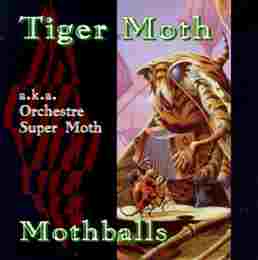The Free-Reed Review
Critiques of Compact Discs, Books and Music
Scores
CD Review:
Tiger Moth
a.k.a. Orchestre Super Moth
Mothballs

Rod Stradling: melodeons, acoustic guitar
Jon Moore: electric guitars, synthesizer, vocal
Ian Anderson: slide guitars, maraccas
Maggie Holland: bass guitar, banjo, vocal
John Maxwell: drums, percussion
Chris Coe: hammered dulcimer
Ian Carter: keyboards, melodeon
Program:
1 Sloe Benga
2 Radio Polka International
3 The Digital Watch
4 Larousse
5 Sumolleh
6 Speed the Plough
7 The Rogue Orange
8 'Smarlon
9 Olympia
10 Conquer Your Glasses
11 Salt of the Earth
12 La Bastingue
13 The Duchess Dressed in Blue
14 Mustapha's Home
15 The Seven Stars
16 Gone with the Lind
17 Nail that Stoat
18 Moth to California
19 The Belfast Poker
20 Marshal Curwen's Polka/Pepper in the Brandy
21 Sestrina
Total Time: 68:26
Released in 1996
Label: Omnion Recordings
(OMM 2012D)
tunes@omnium.com
"Saturday night in Buckinghamshire. . . . In the main hall the monthly
ceilidh looks more like a riot. When the home counties let their hair
down, anything goes. Round the wooden floor a few couples and older folk
are sitting this one out, while lines and squares of dancers are forming
into simple manoeuvres marshalled by a caller from the stage and then
crashing through the steps with yomping delight.
"Onstage, Tiger Moth, the vanguard of the New Wave of English
Country Dance Bands. . . are changing gears, driven forward by the seated
figure of Rod Stradling, a melodeon clutched to his chest, fingers working
overtime and a maniacal stare on his face. He has all the intensity of a
Vietnam veteran in a wheelchair." -- Mark Cooper, from the CD booklet
notes.
Review by
Henry Doktorski:
The first thing I noticed about the CD "Mothballs" was the cover: a
surreal painting by artist Rodney Matthews of a gigantic moth (remember
the ca. 1950 monster movie titled "Mothra?") playing a melodeon (a two-row
diatonic accordion) while a beetle and cricket dance together.
The second thing I noticed about the CD was the music: zany, lively,
danceable and fun. The band obviously loves to play. Colin Irwin wrote
about the recording sessions in the booklet notes:
"The line between divine inspiration and rank stupidity is notoriously
fine. How else are daft japes magically transformed into acts of
breathtaking ingenuity with barely a sleight of the hand? . . . They
didn't rehearse, they barely discussed what they were going to play, let
alone how they were going to play it. . . They just got stuck in and let
nature take its course. Impromptu wasn't the word for it. The only
groundrule they applied to recording was that none of the tracks should go
much beyond three minutes. . . Their own disparate musical backgrounds,
influences and peculiar musical preferences were encouraged to be given
full rein. The whole thing had little apparent order, convention, theory,
or routine. Which is, of course, why it sounded so damn good."
I agree. It does sound damn good. Nice combination of folk tunes on
melodeon, electric guitar power chords, hammered dulcimer, sythesizer and
drums, with elements of reggae, blues, rock 'n roll, jazz, world music and
all manner of strange things besides. Unfortunately, the weakest part of
the album (in my opinion) was Maggie Holland's singing in "Salt of the
Earth," -- the only track which was not strictly instrumental. Her voice
simply sounded untrained and amateurish in comparison to the great
abilities of the instrumental musicians in the band. I would have
preferred to have heard another singer on this track.
This album is for lovers of folk/rock.
